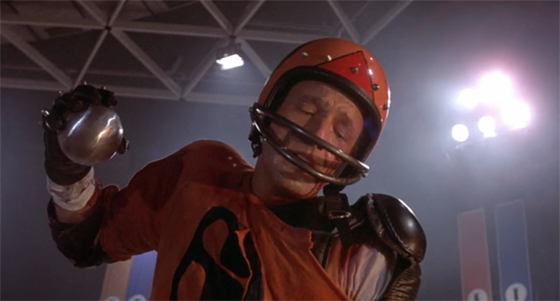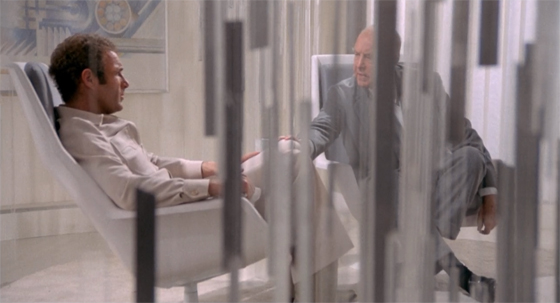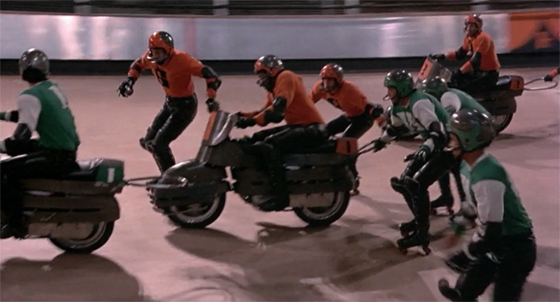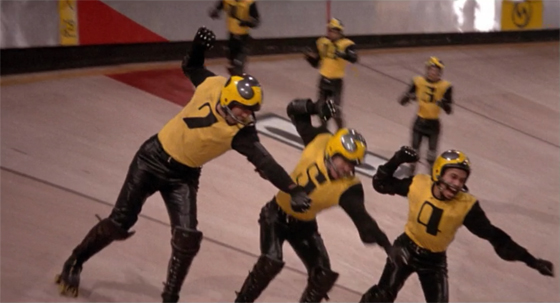
70’s cinema produced a striking number of dystopian visions. Maybe it was fallout from the assassinations and riots of the 60’s, or the fledgling environmentalist movement, or lingering bitterness over Vietnam and Nixon, or all those things; but the future did not look bright. Kubrick traded the idealistic cosmic outlook of 2001: A Space Odyssey (1968) for the rape and ultraviolence of A Clockwork Orange (1971). Soylent Green (1973) tackled rising overpopulation; Silent Running (1972) addressed the corporate devaluing of our environment; The Omega Man (1971) foresaw a world decimated by a virus. The Planet of the Apes sequels turned their focus to themes of revolution and society’s collapse. There was Quintet (1979), Zardoz (1974), and, of course, Logan’s Run (1976), all of which promised that whatever strange, bleak fate awaited us, it would still look very, very 70’s. Such is the case with one of the most iconic productions in this subgenre, Norman Jewison’s Rollerball (1975). The premise is irresistible: there are no longer nations, but corporations; and there is no longer war, but a single sport, the violent “Rollerball,” which involves a heavy steel ball, motorcycles, and, yes, roller skates.

Jonathan E. (James Caan) is urged to quit Rollerball by his boss, Bartholomew (John Houseman).
James Caan, fresh off The Godfather: Part II (1974), plays Jonathan E., who has been playing the sport for an unprecedented ten years. The Houston player has become a star athlete the likes of which Rollerball has never seen. When vaguely sinister corporate exec Bartholomew (John Houseman, The Paper Chase) delivers Jonathan the message from up above that it’s time for him to retire, the Rollerball champion decides to pull a Brett Favre, and stick around no matter what. Meanwhile, he enlists trainer and corporate insider Cletus (Moses Gunn, Shaft) to investigate why the company wants to see him gone. He also seeks to regain contact with his wife (Maud Adams, The Man with the Golden Gun), who was taken from him by the corporation (specifically, one envious and empowered executive); he’s sent a new girlfriend every six months or so in compensation, but suspects his latest of being a spy. Pressure mounts: it’s announced that the rules of Rollerball have been altered, and there will no longer be penalties for violent contact with another player. With two more games to play in the season, Jonathan and his best buddy Moonpie (John Beck, Sleeper) focus on steering the Houston team to victory – even as it becomes increasingly evident that no one may survive to see the trophy.

The film's opening Rollerball match between Houston and Madrid.
For 70’s science fiction, that’s not a bad plot. Unfortunately, that’s all there is to the story; at 125 minutes, the film drags. It’s as though there were a miscommunication between screenwriter William Harrison and Jewison, who was best known for powerful dramas like In the Heat of the Night (1967). Harrison wrote a gritty and despairing satire of a society fallen back to bloodsport for entertainment. Jewison, strongly influenced by Kubrick, focuses on style: endlessly elegant compositions and a soundtrack dominated by classical music (conducted by André Previn). But the result is merely imitative. As he coolly films the real-but-fantastic-looking corporate structures of this futuristic society (the film was shot in Spain and England), there is no subtext, only surface. In other moments, the message is hammered home so soundly that it’s overkill, no matter how beautiful the images are: consider the scene shot in the pre-dawn “magic hour,” as the wealthy, decadent upper-class fire explosive rounds at a line of towering trees, setting fire to them one after another, reveling in destruction. The problem here is that one could simply summarize the premise of the film, and the message would be inherent: society craves violence and leans toward corruption. The result is a film which is frequently pretentious: grasping at profundity and failing to glance it. Death Race 2000, directed by Paul Bartel and released the same year, ironically succeeds where Rollerball fails, tackling almost the exact same story but delivering it with such over-the-top violence and comedy that the whole achieves the sublime (and on a Roger Corman budget). Perhaps Jewison should have let go of the Kubrick approach; though it’s fascinating to see what happened when John Boorman took the exact same tack for the even-more-ridiculous Zardoz. (That will have to be the subject of another piece.)

The Tokyo team takes a kamikaze-style attack formation.
But it’s difficult to write off Rollerball entirely, because just as the viewer begins to drift off into a nap during the endless scenes in which James Caan mumbles some ineffectual (and sometimes inaudible) dialogue in front of video screens and vast, white office spaces, suddenly there will come the squeals of the skates on the rink, and the noise of the steel ball firing as we hypnotically watch it rocket down a gutter round the circumference of the arena, and the motorcycles rev, and the scoreboard lights up, and the game begins. You can tell that Jewison didn’t use a lot of tricks here: he staged the game and filmed it, diving amidst the skaters and bikers, watching them trip and crash and flip through the air and sometimes explode into flame. The Rollerball sequences are compelling because they’re raw and unadorned. Because of this, we feel Jonathan E.’s anxiety when he’s told that penalties are being lifted; we know the games will become a deadly free-for-all. The most chilling moments in the film come near the very end, as the players break off into groups and begin to beat each other into comas with their steel-studded gloves. The audience keeps cheering, even as the point of the game – stealing the ball from a player and tossing it into a goal – recedes and almost disappears entirely. After the last game has reached its brutal finale, the film ends abruptly. Jewison has decided to end on a strong note; but its very abruptness only shines a light on how simple and relatively shallow the whole enterprise was. There’s not much here but what you thought there’d be when you glanced at the poster. It’s kind of a shame, since science fiction fans are rarely treated to films of the same sophistication that they can so easily find on the bookshelves. Rollerball has the gestures of sophistication, but offers little of insight. An even emptier remake arrived in 2002.









